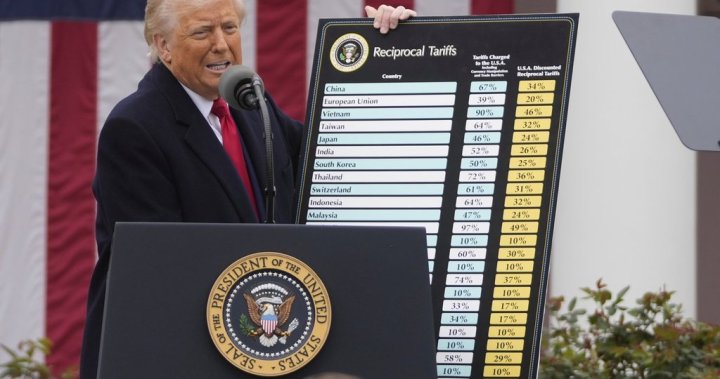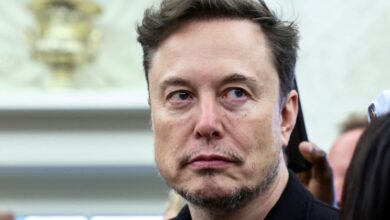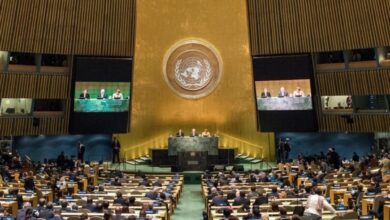Trump pauses 75 countries’ ‘reciprocal’ tariffs, raises China rate to 125% – National

U.S. President Donald Trump said Wednesday he is pausing his so-called “reciprocal” tariffs for 90 days on more than 75 countries that have begun trade negotiations with the U.S., lowering their tariff rate to the baseline of 10 per cent.
The pause was announced hours after his global tariff policy took effect at midnight Wednesday, capping a chaotic week for global financial markets and uncertainty about the world economy.
Trump also announced he was raising tariffs on China once again, to a staggering 125 per cent rate, “based on the lack of respect that China has show to the World’s Markets,” he wrote on Truth Social.
“I did a 90-day pause for the people that didn’t retaliate, because I told them if you retaliate we’re going to double it,” Trump said outside the White House later on Wednesday. “And that’s what I did with China because they did retaliate.
“A deal can be made with every one of them,” he added. “There will be fair deals for everybody, but they weren’t fair to the United States. They were sucking us dry, and you can’t do that.”
U.S. markets surged in response to Trump’s announcement after sharp losses in the morning and nearly a week of vanishing wealth on Wall Street, including billions of dollars in investments.

The pause does not affect ongoing sector-specific tariffs on steel, aluminum and foreign auto sectors, or the 25 per cent tariffs on Canadian goods outside of free trade rules and 10 per cent levies on Canadian energy.
The White House did not immediately specify which countries would see a pause, but U.S. Treasury Secretary Scott Bessent said Vietnam, Japan, South Korea and India were among the countries he and other Trump administration officials were speaking with.
“Every country in the world who wants to come and negotiate, we are willing to hear you, we’re going to go down to a 10 per cent baseline tariff for them,” he told reporters outside the White House.

Get daily National news
Get the day’s top news, political, economic, and current affairs headlines, delivered to your inbox once a day.
“China will be raised to 125 (per cent) due to their insistence on escalation.”
The new rate for China was the latest in a tit-for-tat trade war that has seen both countries increase tariffs on each other since Trump announced his reciprocal tariff policy last Wednesday. That program, which the White House says reflects countries’ tariffs and trade deficits with the U.S., set a 34 per cent rate for China on top of existing 20 per cent levies on Chinese goods.
China vowed to match the 34 per cent rate and ultimately raised duties on the U.S. to 84 per cent Wednesday, after the U.S. upped the Chinese tariff another 50 per cent.
Trump sounded optimistic that a deal could ultimately be reached with China, but said Beijing would have to back off from retaliation and seek talks with his administration.

Bessent said China’s continued escalation was an “own goal” that was a result of Trump’s overall strategy on forcing countries to the negotiating table.
“You might even say that (Trump) goaded China into a bad position,” he said. “They have shown themselves to the world to be the bad actors. We are willing to cooperate with our allies and with our trading partners who did not retaliate.
“It wasn’t a hard message: ‘Don’t retaliate, things will turn out well.’”
Consumer prices in Canada and around the globe are likely to be impacted by the quickly escalating trade war between Washington and Beijing, the world’s two largest economies.
Pause comes after days of confusion
The pause and promises of global trade talks came after days of confusion and conflicting messages from Trump administration officials on whether the reciprocal tariffs could be negotiated lower or eliminated altogether.
Trump himself had said his tariffs “give us great power to negotiate” while insisting they are also “here to stay.”
“I’m telling you, these countries are calling us up, kissing my ass,” he said during a speech at the National Republican Congressional Committee Dinner on Tuesday night.

Bessent said Trump “want to be personally involved” in what he said will be a “separate, bespoke negotiation” with each trading partner that comes to the U.S. for discussions.
He also dismissed the huge swings in financial markets worldwide amid the week-long uncertainty over Trump’s endgame, which he suggested was part of the overall strategy and a sign of Trump’s “courage” as a negotiator.
“The market didn’t understand, those were maximum levels,” he said, referring to the higher rates for several countries on a tariff list released by the White House last week. “Countries can think about those levels as they come to us to bring down their tariffs, their non-trade barriers.
“The only certainty we can provide is that the U.S. is going to negotiate in good faith, and we assume that our allies will too.”
Trump himself said he was demonstrating “flexibility” in his approach.
“I could say, ‘Here’s a wall and I’m going to go through that wall, I’m going to go through it no matter what,’ and you keep going and you can’t get through the wall,” he said. “Sometimes you have to be able to go under the wall, around the wall or over the wall.”
Asked how he would make future determinations on possible exemptions, including for American companies hit hard by tariffs, Trump responded: “Just instinctively.”
Prime Minister Mark Carney, who is running as Liberal leader in the federal election, has said he and Trump agreed Canada will enter “comprehensive negotiations” on trade and security after Canadians elect a new government on April 28.
The federal government has retaliated against separate U.S. tariffs on Canadian goods and industries, including 25 per cent duties on nearly $60 billion worth of U.S. products.
Wednesday also saw the start of Canadian counter-tariffs of 25 per cent on American-made vehicles and auto parts that don’t comply with the Canada-U.S.-Mexico Agreement (CUSMA) on free trade.
© 2025 Global News, a division of Corus Entertainment Inc.
https://globalnews.ca/wp-content/uploads/2025/04/b21d82846ad040aa62e5b9c9edfa021a7513159623a2e583105e922dec3e76fd_35922f.jpg?quality=85&strip=all&w=720&h=379&crop=1
2025-04-09 12:53:55







